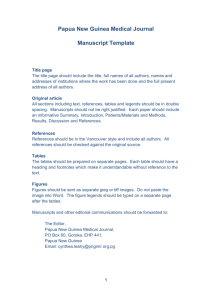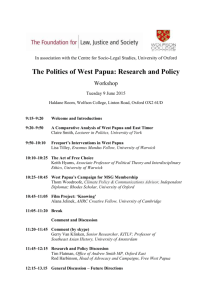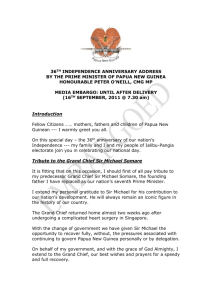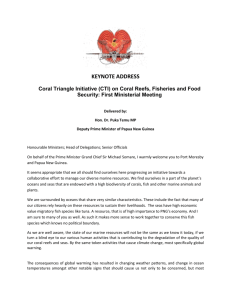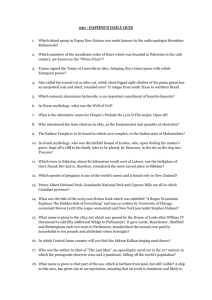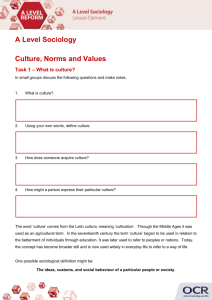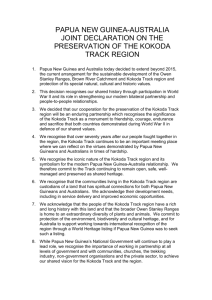United Nations - Office of the High Commissioner on Human Rights
advertisement
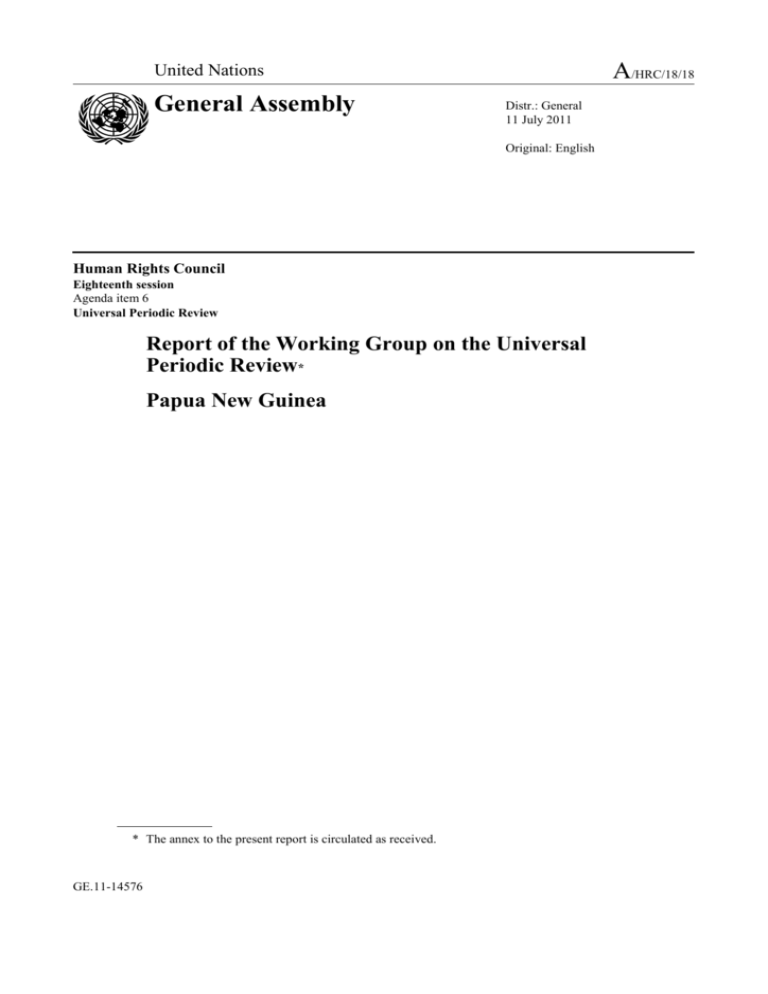
A/HRC/18/18 United Nations General Assembly Distr.: General 11 July 2011 Original: English Human Rights Council Eighteenth session Agenda item 6 Universal Periodic Review Report of the Working Group on the Universal Periodic Review* Papua New Guinea * The annex to the present report is circulated as received. GE.11-14576 A/HRC/18/18 Contents I. II. Paragraphs Page Introduction ............................................................................................................. 1–4 3 Summary of the proceedings of the review process ................................................ 5–77 3 A. Presentation by the State under review ........................................................... 5–20 3 B. Interactive dialogue and responses by the State under review ........................ 21–77 5 Conclusions and/or recommendations ..................................................................... 78–81 11 Composition of the delegation ......................................................................................................... 21 Annex 2 A/HRC/18/18 Introduction 1. The Working Group on the Universal Periodic Review, established in accordance with Human Rights Council resolution 5/1 of 18 June 2007, held its eleventh session from 2 to 13 May 2011. The review of Papua New Guinea was held at the 16th meeting on 11 May 2011. The delegation of Papua New Guinea was headed by Robert G. Aisi, Ambassador and Permanent Representative of Papua New Guinea at the United Nations. At its 17th meeting, held on 13 May 2011, the Working Group adopted the report of Papua New Guinea. 2. On 21 June 2010, the Human Rights Council selected the following group of rapporteurs (troika) to facilitate the review of Papua New Guinea: Cameroon, Maldives and Switzerland. 3. In accordance with paragraph 15 of the annex to resolution 5/1, the following documents were issued for the review of Papua New Guinea: (a) A national report submitted and a written presentation made in accordance with paragraph 15 (a) (A/HRC/WG.6/11/PNG/1); (b) A compilation prepared by the Office of the United Nations High Commissioner for Human Rights (OHCHR) in accordance with paragraph 15 (b) (A/HRC/WG.6/11/PNG/2); (c) A summary prepared by OHCHR in accordance with paragraph 15 (c) (A/HRC/WG.6/11/PNG/3). 4. A list of questions prepared in advance by the Czech Republic, Ireland, Latvia, Norway, Slovenia, Switzerland and the United Kingdom of Great Britain and Northern Ireland was transmitted to Papua New Guinea through the troika. These questions are available on the extranet of the universal periodic review (UPR). I. Summary of the proceedings of the review process A. Presentation by the State under review 5. Papua New Guinea stated that its UPR report was part of its obligations under General Assembly resolution 60/251 and Human Rights Council resolution 5/1. The report, it added, outlined the human rights situation in the country in a frank manner, described how the various human rights treaties to which it was party were being implemented, noted achievements and best practices, and highlighted challenges and constraints that Papua New Guinea faced. 6. Papua New Guinea then described the consultative process engaged in the preparation of the report. It was highlighted that an inter-agency committee had been formed, which included: the Department of Foreign Affairs and Trade and the Department of Community Development (co-Chairs), the Department of Justice and Attorney General, the Department of National Planning and Rural Development, the Department of Finance, the Department of Labour and Industrial Relations, the Ombudsman Commission, the Correctional Services, the Constitutional and Law Reform Commission, the Supreme Court, the University of Papua New Guinea and other stakeholders. 7. Papua New Guinea added that a smaller subgroup from the inter-agency committee, the National UPR Taskforce, had been tasked to compile inputs from stakeholders and prepare the UPR report. 3 A/HRC/18/18 8. It was then highlighted that a rigorous consultation process had been undertaken with stakeholders throughout the country, which included: Government departments and agencies, non-governmental organizations, churches, civil society, academia, community leaders, youth representatives and other relevant stakeholders. The Taskforce had organized four regional consultations, which had engaged stakeholders at the provincial, district and local levels. The consultation undertaken had been open, transparent and inclusive. 9. Papua New Guinea declared that, like other countries, it was faced with human rights issues and challenges. It considered that most of those challenges could be attributed, inter alia, to the country’s current stage of development; cultural diversity, which although not an excuse was a very distinct feature of the country; lack of basic health-care, education and other services; and inaccessibility to government services. 10. Papua New Guinea stated further that while it agreed that Governments must take ownership and provide leadership in addressing human rights issues, one of the most effective ways to accomplish that was to work with the United Nations, the donor community, the private sector and civil society stakeholders 11. Papua New Guinea then explained that it considered the UPR process and the presentation of its report to the Human Rights Council as part of its efforts to garner the collective support of the international community to address human rights issues in the country. It added that the recent visit of the Special Rapporteur on torture and other cruel, inhuman or degrading treatment or punishment signalled the country’s willingness to be open and frank in dealing with the challenges it faced. 12. Papua New Guinea affirmed that its National Constitution accorded all persons living in the country the basic rights and freedoms espoused by the Universal Declaration of Human Rights. It noted that the country had ratified most United Nations human rights conventions. It explained that the delay in ratification of certain instruments should be attributed to the country’s lack of resources and capacity constraints. 13. It was added that the country had put in place the necessary laws and institutional mechanisms to address human rights issues, but that it was experiencing an increase in human rights challenges, such as sorcery-related killings and the use of affordable mobile telephones services and access to Internet to commit human rights violations. Papua New Guinea recognized the need to review existing laws to address those fast-evolving phenomena. 14. It was then highlighted that the country had put in place relevant laws to deal with issues such as domestic and sexual violence and child and youth protection. Relevant institutions were being set up to address human rights issues and complement ongoing work. The ongoing process to establish a national human rights commission was given as an example and it was affirmed that, with all aspects of structure, finance and other aspects resolved, the commission should begin to operate in 2012. 15. It was stated, moreover, that other critical challenges to be addressed included improvements in correctional services and rehabilitation, the empowerment of women in politics and business, gender equality, lack of an appropriate legal framework, lack of capacity, access to legal and justice services, lack of basic services, health- and educationrelated issues, infrastructural developments, HIV/AIDS, climate change and cultural diversity. 16. Papua New Guinea stated further that the current economic situation would change significantly due to the development of the multibillion-dollar liquefied natural gas project in the country. Aided by that important economic project, the country would experience unprecedented economic growth and development and, by 2020, the projected gross domestic product would be about US$ 24 billion. 4 A/HRC/18/18 17. Papua New Guinea added that the greatest challenge would be the translation of that economic growth into tangible benefits to address the development challenges facing the country, such as the improvement of vital infrastructure networks, the provision of basic education and health services and the improvement of the standard of living for the majority of the population. 18. It was acknowledged that socio-economic development had not been impressive, as demonstrated by the high illiteracy rate, the lack of basic education, health services and infrastructure, and increased lawlessness. Additionally, the country was far behind in its human development indicators, ranking 145th of 177 countries (in the human development index published in 2008). The scenario posed significant challenges to the country’s ability to achieve the Millennium Development Goals by 2015. 19. Papua New Guinea stated that, in its efforts to address those and other challenges, it had undertaken important initiatives such as, among others, the establishment of the Papua New Guinea human rights commission, the establishment of the Law and Justice Sector Program, the National Land Development Program and the National Policy on Disability. It was added that those important initiatives required support and assistance through partnerships with the international community. 20. Finally, the delegation of Papua New Guinea declared that it was prepared to engage in frank and open discussions on the human rights situation in the country. The hope was expressed that, through the interactive dialogue, constructive ideas could be discussed on how to address human rights challenges facing the country. B. Interactive dialogue and responses by the State under review 21. During the interactive dialogue, 36 delegations made statements. The delegation of Papua New Guinea was thanked for its frank presentation of the report, for its responses to questions and for the country’s constructive engagement in the universal periodic review process. Recommendations made during the dialogue are to be found in section II of the present report. 22. Australia commended Papua New Guinea for its efforts to strengthen the rule of law and justice institutions and for its progress towards attaining greater gender equality in the justice system and access to justice. It noted the success of the “Let’s Look Out for Moresby” programme and encouraged Papua New Guinea to address the concerns of the Special Rapporteur on the question of torture following his visit. It made recommendations. 23. Switzerland praised the efforts of Papua New Guinea to bridge certain legislative gaps in the field of human rights protection and encouraged it to continue those initiatives. It expressed concern over the situation of women and the excessive use of force by security forces, notably cases of torture. It highlighted that the last execution had taken place in 1954. Switzerland made recommendations. 24. Indonesia fully supported the efforts of Papua New Guinea to raise the standard of living of its population. It encouraged the Government to ensure that the stipulations of the conventions to which Papua New Guinea was a party were fully incorporated into domestic law. Indonesia encouraged the country’s efforts to ensure that women and girls who were victims of violence had access to immediate and effective means of redress and protection. Indonesia made recommendations. 25. Nicaragua welcomed the transparency of Papua New Guinea in preparing the national report. It noted the long-term vision of plans and policies for development and poverty alleviation, particularly regarding the participation of women and the reintegration of detainees into society. It invited Papua New Guinea to take advantage of the 5 A/HRC/18/18 contributions made during the UPR to facilitate its National Strategic Plan – Papua New Guinea Vision 2050. It made a recommendation. 26. Algeria noted that Papua New Guinea was a young country, emerging from the long and complex night of colonialism and, like Algeria, had the moral duty to be constantly engaged in decolonization. It noted that despite the country’s natural resource wealth, guaranteeing economic and social rights continued to be a challenge, notably the rights to food, to health, to housing and to access to drinking water and sanitation. It made recommendations. 27. Slovenia welcomed the adoption of the equality and participation bill, the Sexual Offences and Crimes against Children Act, and the launch of the National Policy on Disability. It was concerned at the persistence of domestic violence and gender discrimination, and at reports of abuse of power by the police. Slovenia regretted delays in ensuring the rights of persons with disabilities and that education was neither free nor compulsory. Slovenia made recommendations. 28. The Czech Republic noted with concern that only a small percentage of the population was registered at birth, which might negatively impact on the legal status of women. It was also concerned at the torture and systematic beatings of detainees upon arrest, or within the first hours of detention, and at the fact that those who attempted to escape from prisons were often tortured and disabled upon recapture. It made recommendations. 29. Malaysia commended Papua New Guinea for its commitment to socio-economic development, as demonstrated by its Vision 2050 plan. It shared the view that progress in poverty eradication, infrastructure development, economic growth and human resource development contributed to the fulfilment of human rights. It noted challenges regarding unemployment, violence against women and girls, HIV/AIDS, the administration of justice and the rule of law. It made recommendations. 30. Slovakia welcomed the inclusion of new offences, such as marital rape, in the Criminal Code. It acknowledged the challenges faced by Papua New Guinea due to environmental threats resulting from climate change and natural disasters. It noted that, in 2010, the Committee on the Elimination of Discrimination against Women had called on Papua New Guinea to strengthen its efforts to provide a discrimination- and violence-free educational environment. Slovakia made recommendations. 31. Brazil regretted that the national report of Papua New Guinea had been submitted late and asked that information be provided about the difficulties encountered in its preparation. It commended the revision of criminal legislation on rape and greater protection for women. It noted a need for further efforts to combat the abuse and discrimination of women. It recognized the country’s initiatives towards a national education policy and expressed concern over violence against children and child prostitution. It made recommendations. 32. Germany asked how the Government ensured the application of the 2003 law to protect persons affected by HIV/AIDS from discrimination. It noted that the Special Rapporteur on the question of torture had indicated that police beatings often reached the level of torture as defined in the Convention against Torture and Other Cruel, Inhuman or Degrading Treatment or Punishment (CAT). Germany also noted that the Committee on the Elimination of Discrimination against Women had expressed concern at reports of brutal torture and killings of women and girls, especially elderly women, accused of witchcraft. Germany made recommendations. 33. Thailand welcomed the steps taken towards the establishment of a national human rights institution, noting that once established, the institution could join the Asia Pacific 6 A/HRC/18/18 Forum of National Human Rights Institutions. It was concerned that poverty, and certain traditional values and cultures, placed women and children in vulnerable positions. It noted a need to ensure that the local village system of court justice met international human rights standards. It made recommendations. 34. China noted that Papua New Guinea actively promoted women’s participation in the decision-making process and protected children’s rights. It commended the country’s efforts to improve medical and health services, to reduce infant and maternal mortality and to prevent the spread of HIV/AIDS. China called on the international community to provide Papua New Guinea with the necessary assistance. China made a recommendation. 35. Maldives stated that it was important that the Working Group on the Universal Periodic Review understand that Papua New Guinea, like Maldives, faced enormous challenges because of its size, geography and capacity constraints. Noting that the projected gross domestic product of Papua New Guinea would nearly double by 2020, it stated that business projects should be people-centred, and executed with respect for human rights and caution because of their environmental risk. Such projects, in the opinion of Maldives, had the potential to further enhance the promotion of human rights. Maldives made recommendations. 36. Papua New Guinea highlighted that the country understood that the question of awareness was an issue that had to be addressed, and which had emerged in the regional consultations undertaken in the preparation of the national report. 37. Regarding questions raised concerning law enforcement agencies, it was explained that the issue had been raised many times and that a policy was currently being examined that would hold perpetrators responsible. It was added that those were discussions that needed to be undertaken. Moreover, a need for training and awareness programmes within the various law enforcement agencies existed. Papua New Guinea added that the visit of the Special Rapporteur on the question of torture had been instructive, and the recommendations made were being reviewed. 38. In response to comments and recommendations made during the interactive dialogue, with respect to questions raised regarding the death penalty, it was pointed out that the death penalty was currently a part of the country’s laws and that only at such a time when Parliament repealed or amended the law would that law cease to be applicable. Courts had invoked the death penalty in some cases. However, in all of those cases, the penalty had been commuted to a life sentence through an appeal to the Supreme Court. It was explained that it would, therefore, be slightly erroneous to state that a moratorium existed, if such a statement was taken to imply that the death penalty had not been invoked. Nevertheless, there had been much debate on the issue and that was a discussion that had to be undertaken within the communities. 39. As for birth registration, it was clarified that the Department of Community Development had undertaken a role in addressing the issue. In that regard, it was stated that once again there was a need for greater awareness on the part of parents and communities to take the necessary steps to register births. 40. Regarding domestic violence, Papua New Guinea stated that the issue had been addressed, and underscored that such acts were criminal offences. It further stated that domestic violence was another matter that required the awareness of law enforcement agencies to ensure that those adequately treated the issue as a crime. 41. Papua New Guinea added that the ratification of the Convention on the Rights of Persons with Disabilities (CRPD) was being seriously considered and that consultations had already taken place. 7 A/HRC/18/18 42. Papua New Guinea then provided information on action taken regarding HIV/AIDS, explaining that the stigmatization of persons with the disease had been criminalized nearly a decade ago. It was added that in recent times there had been a slight drop in the rates of HIV/AIDS as a result of awareness-raising and the provision of antiretroviral medication to persons with HIV. 43. On sorcery, Papua New Guinea acknowledged that it had been a major issue but reiterated that the country’s great diversity was a challenge and called on the international community to assist the country to address that reality. It recalled that the legislation concerning the matter was currently under review, and provided details of the process, which was being conducted by the Constitutional and Law Reform Commission. 44. Regarding questions on education, it was highlighted that the issue was also being addressed and that the economic projects described should have a positive impact in that area. It was explained that one of the issues that should be kept in mind was that 400 of the 800 languages that existed in the country were used in the elementary schools. 45. Morocco welcomed the ambitious vision of the Government for the country’s development over a period of 40 years. It asked for more information on the project, notably the necessary budget, as well as on possible assistance that could be accorded from the international community. Morocco reiterated its appeal to the international community to provide Papua New Guinea with all necessary assistance in order to face its challenges and ultimately guarantee the full realization of human rights. Morocco made a recommendation. 46. Japan expressed concern at the proliferation of domestic and sexual violence against women and children as well as human trafficking and forced labour, while it took positive note of the adoption of the National Strategic Plan 2010-2050 on women and gender development. It also noted the launch of a national disability policy based on CRPD. Japan made recommendations. 47. The Republic of Korea expressed the belief that the ratification of CRPD should follow the adoption of recent measures such as the 2009 National Policy on Disability and the National Advisory Committee on Disability. It commended the Government for undertaking initiatives for the promotion of human rights in spite of environmental threats. It made recommendations. 48. Poland appreciated the adoption of numerous policies, plans and programmes in the framework of the National Strategic Plan – Papua New Guinea Vision 2050, although it noted with concern that human rights infrastructures and legislation were not yet fully developed. Poland was concerned at the persistence of harmful practices affecting women and girls and insufficient anti-discriminatory legislation. Poland made recommendations. 49. France noted with satisfaction that the death penalty had not been applied in Papua New Guinea since 1954. It highlighted that the Special Rapporteur on the question of torture had noted grave dysfunctions in the penitentiary system in May 2010. It asked about progress made in establishing a national human rights institution and shared the concerns expressed by the Committee on the Elimination of Discrimination against Women on the persistence of discrimination against women. It made recommendations. 50. Norway welcomed the recent commitment by Papua New Guinea to halt deforestation, a step that would help protect the indigenous habitat and ecosystem, but it was concerned at reports that the 2010 amendment to the Environment Act undermined the rights of indigenous communities regarding their customary lands. Norway wished to see reports on measures taken by the Government to fight sexual abuse. Norway made recommendations. 8 A/HRC/18/18 51. Hungary commended Papua New Guinea for the enactment of the Lakautim Pikinini Act, which was aimed at providing all children in the country with wider protection. It asked for information on measures taken to ensure the rights of persons internally displaced because of natural disasters. Hungary expressed concern that the current legal framework resulted in the creation of three categories of refugees and that informally adopted children were forced to work long hours and deprived of education and medical treatment. Hungary made recommendations. 52. The United States of America was concerned about widespread violence against women and girls; underrepresentation of women and non-Melanesians in the Parliament; public corruption; human trafficking, including women and children subjected to forced prostitution and involuntary domestic servitude; police misconduct, including excessive use of force; severe abuse of detainees; and very poor conditions of prisons. It made recommendations. 53. Canada welcomed the Government’s consideration of the establishment of an independent human rights commission and the adoption of the National Strategic Plan - Papua New Guinea Vision 2050 to address low social and economic indicators. It was, however, concerned at ongoing discrimination and violence against women and children, including sexual violence, as well as persistent police and intertribal violence and impunity, poor prison conditions and abuse of detainees. Canada made recommendations. 54. Mexico welcomed legislative measures taken in the areas of health, child protection and persons with disabilities. It also welcomed the existence of the Ombudsman Commission and hoped that the initiative to create a human rights commission would succeed. It asked about the vulnerability of indigenous peoples to natural disasters. It made recommendations. 55. Spain asked about measures taken to improve access to sanitation and drinking water in view of epidemics of cholera and tuberculosis and the high incidence of HIV/AIDS. Additionally, noting that Parliament had recently rejected a draft law aimed at reserving a certain number of seats for women, it asked about action taken to guarantee gender equality. It made recommendations. 56. Chile congratulated Papua New Guinea for the wide consultation process undertaken in the preparation of the national report and for the future establishment, in 2012, of a human rights commission, in conformity with the principles relating to the status of national institutions for the promotion and protection of human rights (Paris Principles). It noted the challenges faced by Papua New Guinea in the areas of socio-economic development and the environment, and highlighted the creation of a Government authority to evaluate the consequences of climate change and development. It made recommendations. 57. Regarding the creation of the human rights commission, Papua New Guinea explained that draft legislation had been proposed and was currently under review, although there had been some delays. However, the delegation conveyed that the commitment to establish this overdue and vital body was there. 58. On question regarding the Convention on the Elimination of All Forms of Discrimination against Women (CEDAW), Papua New Guinea explained that it had presented its report in May 2009 and that currently it was working on creating a framework whereby the Government would attempt to address various issues, including legislation. The commitment to protecting the rights of women, the rights of children and, in short, the rights of all, was guaranteed in the Constitution under the provision relating to equality. However it was a question of implementation. 9 A/HRC/18/18 59. In relation to the Environment Act, it was explained that the Act was currently before the courts and the constitutionality of it was being challenged. 60. On issues regarding trafficking in persons, Papua New Guinea explained that action was being taken to address the issue. Papua New Guinea had been consulting with various countries on the issue. 61. On the issue of corruption, the delegation noted that there was widespread community awareness of the issue and it needed to be addressed. The staff of the Ombudsman Commission, created under the Constitution as a body independent from the Government, were working with the Government to address many of the issues that arose as a result of corruption. It was added that there was a national anti-corruption strategy and that Papua New Guinea had signed the United Nations Convention against Corruption. 62. The call for civil society to be included in the way forward after the UPR consultations was noted and it was reiterated that civil society had been consulted. The delegation noted that, for many issues, it was imperative that all of society and all of Government were involved in consultations. 63. As for questions raised on the increase in the representation of women in Parliament, it was stated that the issue was before Parliament and that it was to be examined that week. The delegation noted, however, that Papua New Guinea had three levels of government and that the provincial and local levels already had mandatory provisions within relevant laws that applied, and that women were serving at those levels of government. 64. The Holy See noted that about 800 tribes with diverse languages and cultural traditions made Papua New Guinea a true mosaic of peaceful coexistence and respect. It congratulated the efforts made to conserve and protect the identity of those groups and to ensure the freedom of religion and expression. It made recommendations. 65. Cuba noted that, despite its wealth of important natural resources, Papua New Guinea faced challenges in areas such as the improvement of infrastructure, education and health services, and standard of living. The situation was made worse by the global financial crisis and the unjust economic order. Cuba highlighted the basic education policy and National Health Plan of Papua New Guinea. It made recommendations. 66. Argentina welcomed the 2010-2050 National Strategic Plan and asked about results achieved to date regarding the advancement of women. It made recommendations. 67. New Zealand was deeply concerned about the extremely high rate of maternal mortality and morbidity, and stated that violence was a serious problem for women and girls in Papua New Guinea. It was also concerned about sexual and physical attacks on women, a lack of accountability for perpetrators of such abuses, possible moves to curtail the powers of the Ombudsman, and inhuman treatment and torture in prisons. It made recommendations. 68. South Africa appreciated that the national report had set out the challenges faced by Papua New Guinea in ensuring the effective enjoyment of all human rights by its population. Those challenges included reporting to treaty bodies and a lack of capacity to fully implement various policies. It encouraged the international community to provide Papua New Guinea with the technical assistance required to overcome those challenges. It made recommendations. 69. Costa Rica noted the call by Papua New Guinea for technical assistance and encouraged the country to make use of all available tools to obtain such assistance. Costa Rica congratulated the country for action taken regarding sexual and domestic violence and for its commitment to ratify the core human rights instruments. It recognized the country’s 10 A/HRC/18/18 challenges and expressed concern at the impact of climate change and environmental degradation. It made recommendations. 70. The United Kingdom was concerned at the alarming reports of police abuse and urged Papua New Guinea to end impunity for such abuses. It requested further information on the Government’s response to the report of the Special Rapporteur on the question of torture following his visit. It also noted a deeply rooted negative perception of women and the increase in reports of sorcery-related crime. It made recommendations. 71. Haiti welcomed the delegation of Papua New Guinea and the open and inclusive approach taken in the preparation of the national report. Haiti made recommendations. 72. Cameroon noted with interest the legislative measures taken for the promotion of civil and political rights as well as economic and social rights, notably legislation on sexual crimes against minors, treatment and prevention of HIV/AIDS, protection of children and juvenile justice. It called on the Human Rights Council and the international community to provide the country with assistance. 73. Samoa acknowledged the efforts of Papua New Guinea to prepare the national report and highlighted the eleventh UPR session as special, since four Pacific Island countries were being reviewed. It congratulated Papua New Guinea for the progress made in treaty ratification, for submitting its 2010 report to the Committee on the Elimination of Discrimination against Women, and for progress made in legislative reform on sexual violence and crimes against women and children. It made recommendations. 74. Papua New Guinea thanked the delegations that had spoken. Regarding questions on cooperation with treaty bodies, Papua New Guinea reiterated what had been stated about the need to cooperate with international organizations such as the United Nations Development Programme and regional organizations such as the Economic and Social Commission for Asia and the Pacific. It recalled that being a Member of the United Nations entailed obligations of reporting, which was often a challenge because of the capacity issues faced. Papua New Guinea explained that those obligations were important to the country. 75. On the proposed amendments to curtail the Ombudsman’s power, it was explained that those were currently being challenged before the Supreme Court and that the judicial process should address the issue in due time. 76. With regard to the ratification of treaties, it was reiterated that all efforts would be made to address that issue. On invitations to special rapporteurs, it was explained that the country would welcome further visits and that the country was open to such visits. 77. In conclusion, Papua New Guinea reiterated that the reporting process had been very important and had involved all of the citizens. The report presented was forthright and attempted to cover as much as possible. Papua New Guinea called on the international community to assist the country. It was clarified that the help required was not so much financial, but rather technical, such as the sharing of expertise. Papua New Guinea acknowledged the contribution of many donors, including partners in the Pacific, Asia and Europe. Papua New Guinea thanked speakers for their remarks and contributions and affirmed that the country would try its best to make sure that the framework of human rights and the Constitutional provisions were respected. II. Conclusions and/or recommendations 78. The recommendations listed below have been examined by Papua New Guinea and enjoy its support: 11 A/HRC/18/18 78.1. Consider becoming party to important international legal instruments to which it is not yet a party (Indonesia); 78.2. Consider the possibility of signing and ratifying the main universal human rights instruments to which it is not yet a party (Haiti); 78.3. Accede to the Optional Protocol to CEDAW (OP-CEDAW) and fully incorporate CEDAW into domestic legislation without delay (United Kingdom); 78.4. Study the possibility of ratifying CAT, OP-CEDAW and the International Convention for the Protection of All Persons from Enforced Disappearance (CED) (Argentina); 78.5. Consider ratifying CAT (Poland); 78.6. Consider ratifying CRPD, believing that the ratification should follow recent measures such as the launch of the 2009 National Policy on Disability and the establishment of the National Advisory Committee on Disability (Republic of Korea); 78.7. Proceed to ratify CRPD (Australia); 78.8. Ratify CRPD (Slovenia); 78.9. Ratify CRPD and incorporate a disability perspective into its Vision 2050 and other development plans and programmes (Maldives); 78.10. Withdraw the reservations issued to seven articles to the Convention relating to the Status of Refugees 1951 (Hungary); 78.11. Continue working towards the harmonization of its national legislation with those rights contained in international human rights treaties to which Papua New Guinea is a State party (Nicaragua); 78.12. Pursue efforts with regional and international communities in seeking financial and technical assistance to domesticate ratified international treaties (Samoa); 78.13. Incorporate the provisions of CEDAW, ratified in 1995, into the domestic legal system (Poland); 78.14. Harmonize national legislation and carry out the necessary efforts in order to implement CEDAW (Mexico); 78.15. Take appropriate measures to fully implement CEDAW (Hungary); 78.16. Develop further and implement policies and legislation aimed at gender equality and the empowerment of women, including combating all forms of gender-related violence (Brazil); 78.17. Consider reinforcing the legal framework for the prevention of violence against women (Argentina); 78.18. Take steps to implement a comprehensive legal framework addressing all forms of violence against women and children (Canada); 78.19. Introduce and implement a comprehensive legal framework to protect women and girls against all forms of gender-based violence and, in particular, introduce legislation that prohibits domestic violence (Norway); 78.20. Make every effort to eliminate domestic violence, with special attention to enacting and implementing a comprehensive legal framework addressing all 12 A/HRC/18/18 forms of violence against women, sharing the international communities’ concerns on the lack of laws specifically prohibiting violence against women and girls within the family (Republic of Korea); 78.21. Accelerate its review of the law on sorcery and sorcery-related killings and strengthen the enforcement of relevant legislation (Czech Republic); 78.22. Review the law on sorcery and sorcery-related killings and investigate, prosecute and punish perpetrators of such crimes (Poland); 78.23. Pursue efforts with regional and international communities in seeking financial and technical assistance to establish a national human rights institution (Samoa); 78.24. Undertake all measures to ensure the establishment of the national human rights commission with the support of the international community (Thailand); 78.25. Take the necessary steps towards the establishment of a national human rights institution, in accordance with the Paris Principles (Canada); 78.26. Continue the process for the establishment of a national human rights institution in conformity with the Paris Principles (Morocco); 78.27. Continue efforts to consolidate a national human rights institution in accordance with the Paris Principles (Costa Rica); 78.28. Complete the establishment of the national human rights institution (Maldives); 78.29. Establish a national human rights institution in accordance with the Paris Principles (Poland); 78.30. Establish a national human rights institution in accordance with the Paris Principles (Argentina); 78.31. Establish a National Human Rights Institution in line with the Paris Principles (Norway); 78.32. Ensure the establishment of an independent national human rights commission, in line with the Paris Principles, by 2012, as stated in the national report (South Africa); 78.33. Create, as soon as possible, a national institution for the protection of human rights in conformity with the Paris Principles (France); 78.34. Without delay, meet its stated intent of establishing an independent national human rights institution in accordance with the Paris Principles (New Zealand); 78.35. Undertake a national awareness campaign about the lasting negative effects of gender-based violence (United States); 78.36. Support efforts to create safe places for women who have been victims of gender-based violence (New Zealand); 78.37. Take necessary measures to implement the National Disability Policy (Japan); 78.38. Promote the creation of a database regarding persons with disabilities, with the objective of guiding relevant policies to make their rights effective (Mexico); 13 A/HRC/18/18 78.39. Improve its cooperation with the United Nations treaty bodies by reporting on the implementation of its obligations under the Conventions it has ratified; namely, the International Covenant on Economic, Social and Cultural Rights, the International Covenant on Civil and Political Rights (ICCPR), the International Convention on the Elimination of All Forms of Racial Discrimination (ICERD), CEDAW and the Convention on the Rights of the Child (CRC) (Norway); 78.40. Consider requesting technical cooperation and assistance for the preparation and submission of reports to the United Nations treaty bodies (Chile); 78.41. Pursue efforts with regional and international communities in seeking financial and technical assistance to report on and implement ratified treaties, and for UPR follow-up (Samoa); 78.42. Extend a standing invitation to special procedures mandate holders as a way of informing and supporting human rights reforms (Maldives); 78.43. Extend an open and standing invitation to all special procedures, welcoming with satisfaction the official invitation to the Special Rapporteur on the question of torture in 2010 (Spain); 78.44. Issue an invitation to the Special Rapporteur on violence against women, its causes and consequences (Slovenia); 78.45. Extend an invitation to the Special Rapporteur on violence against women to visit Papua New Guinea (Norway); 78.46. Invite the Special Rapporteur on violence against women to visit the country (Canada); 78.47. Take further steps to promote the rights of women and end all forms of discrimination experienced by the female population of Papua New Guinea (South Africa); 78.48. Adopt a national gender policy and an action plan aimed to ensure equality between men and women within the framework of domestic law (Switzerland); 78.49. Take measures to ensure greater representation in Parliament for women (New Zealand); 78.50. Take effective measures to prevent alleged abuse and violence by police officers, encouraging the Government to respond appropriately to the Special Rapporteur on the question of torture’s concerns and recommendations on this matter (Republic of Korea); 78.51. Continue to take a comprehensive approach through its law and justice, civil society and health programmes to address the high incidence of violence against women (Australia); 78.52. Undertake more effective measures to address the problems of impunity and violence against women and girls, including by strengthening law enforcement and the judicial system (Malaysia); 78.53. Consider prohibiting by law corporal punishment within the family and other institutions (Chile); 14 A/HRC/18/18 78.54. Modify its legislation to ensure that the provisions prohibit and penalize the sale and trafficking of girls and boys under the age of 18 for sexual and labour exploitation (Hungary); 78.55. Increase efforts to prosecute offenders of human trafficking, identify and protect trafficking victims, and make efforts to prevent trafficking crimes (United States); 78.56. Enhance human rights training for police forces and ensure their accountability for respecting human rights (Slovenia); 78.57. Ensure comprehensive human rights training for its law enforcement personnel with a view to prevent any excessive use of force and to investigate, prosecute and punish the perpetrators of such human rights violations, in accordance with international standards (Slovakia); 78.58. With the continued support of the international community, reinforce the capacity of law enforcement authorities through awareness-raising of police and other law enforcement officials to ensure their compliance with international human rights standards and by adopting relevant legislation (Japan); 78.59. Conduct relevant human rights training for senior police (New Zealand); 78.60. Look to replicate successful programmes that aim to keep adolescents out of the prison system wherever possible (Australia); 78.61. Enhance the transparency of its public decision-making and the use of public resources for public purposes (United States); 78.62. Take necessary measures to ensure that all children are registered at birth (Czech Republic); 78.63. Ensure that all children are registered at birth and make every effort to register all persons not previously registered (Slovakia); 78.64. Increase efforts to ensure the registration of all children at birth (Brazil); 78.65. Continue its committed efforts in economic and social development and improving people’s living standard so as to protect effectively the rights of its people (China); 78.66. Continue implementing strategies and plans for the socio-economic development of the country (Cuba); 78.67. Continue implementing programmes and measures aimed at ensuring universal and quality health and education services for all its population (Cuba); 78.68. Prioritize efforts to achieve the maternal health and basic education Millennium Development Goals (Australia); 78.69. Redouble efforts to reduce maternal mortality, including through the recent maternal health ministerial taskforce and the emergency response action plan (New Zealand); 78.70. With international assistance, intensify efforts against the spread of HIV/AIDS in the country, with increased attention to prevention and care for affected children (Algeria); 15 A/HRC/18/18 78.71. Continue its leading international efforts to tackle global warming, including by reminding developed countries and other major emitting States of their obligation to help promote and protect human rights by reducing greenhouse gas emissions to safe levels (Maldives); 78.72. Continue taking measures that favour the increase of enrolment rates in all its territory (Chile); 78.73. Take appropriate measures, in accordance with its international obligations, aimed at ensuring universal education, including free and compulsory primary education (Malaysia); 78.74. Pursue efforts with regional and international communities in seeking financial and technical assistance to advance human rights in Papua New Guinea (Samoa); 78.75. Engage civil society in the UPR follow-up process (Poland). 79. The following recommendations will be examined by Papua New Guinea, which will provide responses in due time, but no later than the eighteenth session of the Human Rights Council in September 2011: 79.1. Take steps to ratify all human rights instruments (Norway); 79.2. Ratify as soon as possible important international human rights instruments to which it is not yet a party, inter alia, CAT, CRPD and CED, and issue a standing invitation to special procedures (Japan); 79.3. Consider ratifying CAT and its Optional Protocol, and CRPD (Brazil); 79.4. Ratify CAT (Slovenia); 79.5. Consider acceding to the main international human rights instruments to which it is not party, particularly CAT and its Optional Protocol (Costa Rica); 79.6. Ratify CAT, as well as its Optional Protocol (Switzerland); 79.7. Ratify CAT and accede to its Optional Protocol (United Kingdom); 79.8. Ratify CAT and the Optional Protocol thereto and bring the definition of torture in line with the international standards in order to criminalize such treatment (Czech Republic); 79.9. Ratify CAT and its Optional Protocol, and consider designating the national human rights institution, when established, as the country’s national preventive mechanism (Maldives); 79.10. Become party to CAT and its Optional Protocol (New Zealand); 79.11. Sign and ratify CAT, CED and CRPD (Spain); 79.12. Accede, as a priority, to CED, to CRPD and to the two Optional Protocols to CRC (Algeria); 79.13. Ratify the Protocol to Prevent, Suppress and Punish Trafficking in Persons, Especially Women and Children, supplementing the United Nations Convention against Transnational Organized Crimes (United States); 79.14. Ratify the 1954 Convention relating to the Status of Stateless Persons and the 1961 Convention on the Reduction of Statelessness (Slovakia); 16 A/HRC/18/18 79.15. Consider ratifying International Labour Organization Convention No. 169 (1989) concerning Indigenous and Tribal Peoples in Independent Countries and take operational steps to implement the United Nations Declaration on the Rights of Indigenous Peoples (Norway); 79.16. Ensure without delay the full incorporation of CEDAW provisions into domestic law, and take further steps to prevent all forms of gender-based violence (Slovenia); 79.17. Put in place legislation ensuring the equality of men and women and prohibiting discrimination against women (Canada); 79.18. Eliminate any legislation that has discriminatory effects against women in family and public life, in line with CEDAW, by, inter alia, including “gender” as a prohibited ground of discrimination in its Constitution (Norway); 79.19. Review its national legislation so as to repeal all laws giving rise to discrimination against women and girls, with the aim of bringing the domestic system into line with the commitments made at the international level (Switzerland); 79.20. Amend its legislation to include the principle of equality between men and women; Parliament should adopt the equality and participation bill in order to enhance gender equality in the political sphere (Norway); 79.21. Develop a legislative reform package to eliminate gender-based violence (Germany); 79.22. Enact and implement a comprehensive legal framework addressing all forms of violence against women (Poland); 79.23. Adopt an adequate legal framework to combat all forms of violence against women and put in place an effective complaint system in order to bring the perpetrators of these acts before justice (France); 79.24. Adopt legislative measures to eliminate gender violence and ensure that all women and girls who were victims of gender violence have access, among others, to health, legal and emergency services as recommended by the Committee on the Elimination of Discrimination against Women (Spain); 79.25. Withdraw support from the proposed amendment that would curtail the power of the Ombudsman Commission, especially its ability to investigate independently human rights violations (United Kingdom); 79.26. Consider including the component of human rights education and training in its national education programme and in the training programmes for the police and those who administrate justice (Costa Rica); 79.27. Develop proactive strategies for economic development and social cultural transformation, with priority given to addressing the problems of discrimination against women, gender-based violence, the HIV/AIDS epidemic, child labour, corporal punishment of children, and sorcery-related killings (Thailand); 79.28. Strengthen its cooperation with treaty bodies and give the greatest possible attention to the recommendations of the Committee on the Rights of the Child and the Committee on the Elimination of Discrimination against Women and the various United Nations joint reports (Haiti); 17 A/HRC/18/18 79.29. Implement the recommendations of the Special Rapporteur on the question of torture in order to address the violations to fundamental rights highlighted by him during his visit, notably, the generalized ill-treatment of detainees, the total absence of rights of incarcerated persons, the degrading conditions of detention and the absence of a control mechanism, leading to excessive periods of preventative detention (France); 79.30. Increase involvement in matters of State by women and ethnic minorities (United States); 79.31. Abolish the death penalty in its legislation, while taking note of the absence of executions in the country since 1954 (Spain); 79.32. Abolish the death penalty and adopt laws favouring the protection of women, and combat domestic violence (Holy See); 79.33. Fully abolish the death penalty (Czech Republic); 79.34. Take steps to abolish the death penalty entirely, including the ratification of the Second Optional Protocol to ICCPR (Slovakia); 79.35. Invest adequate financial and manpower resources to improve its prison conditions, to the level required by its human rights obligations (United States); 79.36. Take effective measures to ensure that the condition of persons in detention are in conformity with relevant international standards (Canada); 79.37. Prohibit corporal punishment of children in all settings and ensure protection against child labour and child prostitution (Slovenia); 79.38. Implement effective criminal justice mechanisms to combat impunity (United States); 79.39. Implement strict judicial measures to fight impunity, including the investigation and prosecution of racial hatred and related violence through criminal legal proceedings and other measures (Canada); 79.40. Take stronger measures to professionalize the police force by demanding accountability and retraining key personnel, including seeking the assistance of international law enforcement experts (United States); 79.41. Carry out effective and independent investigations of allegations of excessive use of force by the security forces to bring perpetrators of these acts to justice and ensure that victims benefit from full reparations (Switzerland); 79.42. Investigate all cases of torture and bring perpetrators to justice (Czech Republic); 79.43. Ensure that all complaints of violence, including sexual violence against detainees perpetrated or facilitated by police, are fully investigated and that suspected perpetrators are brought to justice, in line with concerns raised by the Special Rapporteur on the question of torture (Germany); 79.44. Provide comprehensive human rights training for law enforcement officers, including on issues related to forced eviction and violence against detainees and to racial discrimination and xenophobia (Canada); 79.45. Take immediate measures to investigate cases of brutal torture and killings of girls and women, especially elderly women, accused of witchcraft, and to prosecute and punish perpetrators (Czech Republic); 18 A/HRC/18/18 79.46. Vigorously investigate all reports of sorcery-related killings to ensure that the perpetrators are brought to justice, and develop and implement strategies, including for social and cultural change, to prevent further killings (United Kingdom); 79.47. Circulate and implement the recently adopted United Nations Rules for the Treatment of Women Prisoners and Non-custodial Measures for Women Offenders (the Bangkok Rules), and seek necessary support from the United Nations Office on Drugs and Crime and OHCHR (Thailand); 79.48. Ensure that all complaints on gender-based violence, regardless of perpetrators, be investigated and brought to justice (Maldives); 79.49. Undertake effective measures to ensure the accessibility of legal and judicial services to persons in rural and remote areas (Malaysia); 79.50. Implement programmes to increase the human rights awareness of village and community leaders, and develop measures to ensure that decisions made by village courts are in line with international standards, particularly the principle of non-discrimination, and, at the same time, take measures to promote among its citizens greater awareness of their rights and access to the formal judicial system (Thailand); 79.51. Provide adequate judicial review and compensation for cases of government projects that have negative environmental impact on the land and resources of traditional landowners to ensure that their rights to property and right to environment are duly respected. Engagement with local communities in the decision-making process of any government project should also be promoted (Thailand); 79.52. Decriminalize sexual relations between consenting adults of the same sex (Slovenia); 79.53. Decriminalize sexual relations between consenting adults of the same sex (France); 79.54. Amend national legislation to include “sexual orientation” and “gender” as prohibited grounds for discrimination (United Kingdom); 79.55. Take concrete and practical measures to protect human rights defenders who, according to a United Nations joint report, have been threatened, attacked and in some cases murdered (Haiti); 79.56. Review its laws relating to abortion and, more specifically, remove punitive provisions imposed on women who undergo abortion and provide them with access to quality services for the management of complications arising from unsafe abortion (Czech Republic); 79.57. Step up efforts to improve and conserve the environment, including by strengthening the relevant laws and providing the public with the necessary information, education and awareness regarding the impacts of climate change and environmental pollution and degradation (Malaysia); 79.58. Increase its scrutiny over extractive and logging industries and associated companies and businesses, with a view to reducing its negative impact on the environment and, consequently, its negative effects on the full enjoyment of human rights (Maldives); 19 A/HRC/18/18 79.59. Review its legal measures and, if necessary, request the necessary technical assistance so as to ensure that boys and girls of all regions of the country have access to free and compulsory primary education (Mexico); 79.60. Ensure that education is accessible to all children, including by providing the educational system with necessary resources (Slovakia); 79.61. Consider the possibility of ensuring free and compulsory education, at least at the primary level (Algeria); 79.62. Guarantee universal basic education, in accordance with the international human rights treaties it has ratified, and ensure that primary education is compulsory and free for all (Indonesia); 79.63. Ensure compulsory, free and accessible primary education for all. Enhance also the availability and accessibility of secondary and higher education and close the gender gap at all levels of education (Slovenia); 79.64. Ensure that primary education is free and compulsory and prioritize the accessibility of secondary education, making it progressively free in accordance with the new Universal Plan on Basic Education (Spain); 79.65. Adopt further measures to ensure universal primary education, free of charge (Brazil); 79.66. Continue working towards the elimination of the user-pay policy for education with the aim of providing free primary education, as per Millennium Development Goal 2 (South Africa); 79.67. Work closely with its citizens, especially the indigenous population, in order to promote environmental protection (Norway); 79.68. Stop the increasing deforestation and indiscriminate exploitation of minerals since, on one hand, this limits the right of indigenous peoples to live in their traditional agricultural lands and, on the other hand, it contributes enormously to the ecosystem’s imbalance and accelerates climate change with the negative consequences it brings (Holy See); 79.69. Review the 2010 amendment to the Environment Act in order to ensure consistency with the objectives of the United Nations Declaration on the Rights of Indigenous Peoples (Norway). 80. The recommendations below did not enjoy the support of Papua New Guinea: 80.1. Continue to suspend capital punishment by putting in place, as a first step, a de jure moratorium against executions and eventually abolishing the death penalty (Switzerland); 80.2. Confirm the de facto moratorium on the death penalty by definitively and de jure abolishing the death penalty in all circumstances (France). 81. All conclusions and/or recommendations contained in the present report reflect the position of the submitting State(s) and/or the State under review. They should not be construed as endorsed by the Working Group as a whole. 20 A/HRC/18/18 Annex Composition of the delegation The delegation of Papua New Guinea was headed by Mr. Robert G. Aisi, Ambassador and Permanent Representative of Papua New Guinea at the United Nations in New York and composed of the following members: • Mr Sakias Tameo, Director – International Organisations Branch, Department of Foreign Affairs and Trade; • Mr Joseph Molita, Legal Adviser, Ombudsman Commission of Papua New Guinea; • Mr Patrick Niembo, Legal Adviser, Ombudsman Commission of Papua New Guinea; • Mrs Nanai Puka-Areni, Legal Adviser, Papua New Guinea Constitutional Law and Reform Commission; and • Mr. Dino Mas, Second Secretary, Permanent Mission of Papua New Guinea to the United Nations in New York. 21
